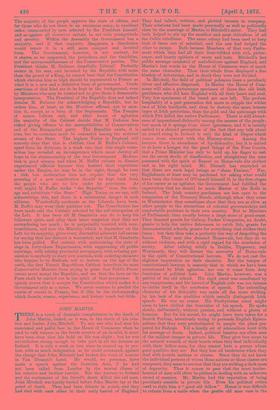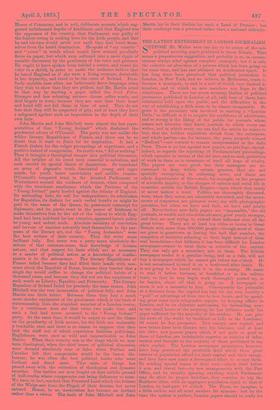JOHN MARTIN.
THERE is a touch of dramatic completeness in the death of John Martin, linked, as it was, to the death of his rela- tive and leader, John Mitchell. To any one who had seen his emaciated and pallid face in the House of Commons when he used to talk treason in the feeble accents of an invalid, it must have been clear that his hold on life was slight ; but he was nevertheless strong enough to take part in all the debates on Ireland. It is only a week or two since he started up to pro- test, with as much indignation as he could command, against the charge that John Mitchell had broken his word of honour in Van Diemen's Land. He would, we presume, have made a speech against the Coercion Acts, if he had not been called from London by the mortal illness of his relative and brother convict. But the journey to Ireland and the excitement of his friend's death killed the old man. John Mitchell was hardly buried before John Martin lay at the point of death. They had been friends in youth, and they had vied with eaoh other in their early hatred of England. They had talked, written, and plotted treason in company. Their relations had been made personally as well as politically close by the marriage, of Martin to Mitchell's sister. They had both helped to stir up the smallest and most ridiculous of all the Celtic rebellions. The same colony had been used to keep both of them out of mischief, and the one had helped the other to escape. Both became Members of that very Parlia- ment which they had all their lives vilified with rich, pictur- esque, and hearty epithets of scorn and hate. Mitchell's last public message consisted of maledictions against England, add Martin's last words in the House of Commons were of much the same character. Thus their whole lives displayed a fine kinship of detestation, and in death they were not divided.
In Mitchell, the field of political polemics loses a peculiarly bitter and effective disputant. In Martin the House of Com- mons will miss a picturesque specimen of those fine old Irish gentlemen who did hate England with all their heart and soul. Very few specimens of the breed are now left. The profuse hospitality of a past generation did more to cripple the wilder race of Irish landlords, and thus to destroy the more intense types of Irish patriotism, than the gold and the patronage with which Pitt killed the native Parliament. There is still abund- ance of impassioned disloyalty among the masses of the people; but much of it springs from sheer ignorance, and it is usually united to a shrewd perception of the fact that any talk about an armed rising in Ireland is only the kind of blague which comes from contact with the Blarney-stone. Among the lawyers there is abundance of lip-disloyalty, but it is united to so keen a hunger for the good things of the Four Courts, that a Prime Minister has only to hold up his finger to cast out the seven devils of disaffection, and straightway the man possessed with the spirit of Repeal or Home-rule sits clothed and in his right mind. Mr. Disraeli has reminded us that there are such legal beings as " sham Fenian." Nay, Englishmen at least may be pardoned for asking what would have been the future of O'Connell himself if, in the first stages of his career as an agitator, the Government had fulfilled the expectation that he should be made Master of the Rolls in Ireland. The Irish country gentlemen are less open to the temptation of the Treasury Bench, although when they come to Westminster they sometimes show that- they are as alive as other people to the attractions of colonial governorships add comfortable positions in their own country. But as Members of Parliament, they usually betray a large store of good-sense. They demand grants for Galway Packet Companies, no doubt, grants to help the native fishermen to catch fish, grants for denominational schools, grants for everything that strikes their fancy ; but they thus take a perfectly fair way of despoiling the Saxon. They may also demand Home-rule, but they do so without violence, and with a rigid regard for the courtesies of society. After talking wildly in Dublin, Tipperary, and Westmeath, they will discuss the necessity of Home-rule in the spirit of Constitutional lawyers. We do not cast the slightest imputation on their sincerity. But the temper of constitutional lawyers is scarcely that to which we have been accustomed by Irish agitation, nor can it come from deep fountains of political hate. John Martin, however, was a patriot of the old- school. His rigid creed was unsoftened by any compromise, and his hatred of English rule was too intense to clothe itself in the courtesies of speech. The unbending character of his disloyalty was made all the more striking by his lack of the qualities which usually distinguish Irish speech. He was no orator. His Presbyterian creed might seem to have chilled the fountains of his speech. He spoke slowly, deliberately, without passion, and without a gleam of humour. But for his accent, he might have been taken for a Scotch Puritan, laboriously trying to persuade English Episco- palians that they were predestinated to people the place pre- pared for Bishops. Yet a kindly air of admonition went with his message of doom. Indeed, political fanatics are often men of the mildest temper in private life. They give free scope to the natural warmth of their hearts when they deal individually with their fellow-men, for they cannot hate a person whose good qualities they see. But they lose all tenderness when they deal with hostile nations or classes. Since they do not know the individual persons of whom those nations or those classes are oomposed, they seem to assume that they are striking a dark mass of depravity. Thus it comes to pass that the most tender- hearted of men will often be pitiless in dealing with an unknown crowd of enemies. Mr. Martin had the reputation of being peculiarly amiable in private life. Even his political critics used to style him a " good, old- fellow." Hence it was difficult to refrain from a smile when the gentle old man- rose in the House of Commons, and in soft, deliberate accents; which sug- gested unfathomed depths of kindliness, said that England was the oppressor of his country, that Parliament was guilty of the foulest wrong in making laws for the Irish people, and that he and his race would never rest until they had freed them- selves from the hated domination. Be spoke of "my country " and " yours" in words which would have seemed peculiarly fierce on paper, but which were softened into, a mere ripple.of amiable discontent by the gentleness of his voice and gestures. He ought to have spoken from behind a screen, and raised his voice to a shriek, in order to make the audience believe that he hated England as if she were a living creature, detestable in her depravity, and fated to be the curse of Ireland. Pecu- liarly amiable men often use ludicrously fierce language when they wish to show that they are pitiless, and Mr. Martin acted in that way by starting a paper called the Irish Felon. Stronger and less relenting natures choose softer words, and deal largely in irony, because they are sure that their heart and hand will not.fail them in time of need. They do not fear that they will be suspected of pity, and at least they have a safeguard against such an imputation in the depth of their own hate.
John Martin and John Mitchell were almost the last repre- sentatives of that "Young Ireland" which disdained the prudential advice of O'Connell. The party was not unlike the wilder literary Republicans of France, and there can be no doubt that it went to Paris for its inspiration. It had ,a French disdain for the vulgar promptings of experience, and a positive hatred of compromise. Its motto was, " All or nothing." Thus it brought a theological temper into political discussion. All the articles of its creed were essential to salvation, and each carried its special threat of damnation. So trenchant an array of dogmatic truth fascinated young and eager minds, for youth hates uncertainty and middle courses. O'Connell's tempered trust in the detested Parliament at Westminster seemed the coldness of treason, when compared with the trenchant anathemas which the Puritans of the "Young Ireland" party hurled against the infamy of England. Its unbending hate, its call for independence, its admiration for Republics, its disdain for such verbal loyalty as might be paid to the name of the Queen, its passionate contempt for diplomacy, and •its poetic trust in the power of Irishmen to make themselves free by the aid of the valour to which Eng- land had been indebted for her victories, appeared heroic policy to•young and ardent souls. Absolute certainty of conviction and fervour of emotion naturally lend themselves to the pur- poses of the literary art, and the "Young Irelanders" were the best writers of their country. They did write some brilliant folly. But never was a party more absolutely de- stitute of that common-sense, that knowledge of human nature, and that respect for facts which •are as necessary • -to a master of political potion as -a knowledge of mathe- matics is to the astronomer. The literary Republicans of France failed because they had filled their heads -with non- sense about the Republic of Rome, because they fancied that a single day -would suffice to change the political habits of a thousand years, and because they did not see the emptiness of such words as Liberty, Equality, and Fraternity. The literary "Repealers of Ireland failed for precisely the same reason. John Mitchell was the very incarnation of political folly, and John Martin was little better. Between them they had a much more slender equipment of the good-sense which is the basis of statesmanship than the stupidest member of a London vestry, for a vestryman does see that twice two make four, and such a fact had never occurred to the " Young Ireland " party. At the same time, it would be unjust to cast the blame on the peculiarity of Irish nature, for the Irish are eminently a teachable race, and there is no reason to suppose that they lack the stuff out of which experience fashions politicians. Englishmen were once as wild and impracticable as John Martin. When their country was in the stage which we may term theological, when the chief issues of political discussion were deemed absolutely true or false, when Puritan and Cavalier felt that compromise would be the basest dis- honour, he was often the best political leader who went furthest and dared most. That state of things has passed away with the extinction of theological and dynastic enmities. Our battles are now fought on that middle ground of half-truths where compromise can hnn' g dishonour to none: We have, in fact, reached that Promised Land which the-fathers of the Whigs saw from the Pisgah of their dreams, but never, entered. Hence, to us, moderation has become an instinct rather than a -virtue. The fault of John -Mitchell and John
Martin lay in their disdain for such a Land of Promise ; but their contempt was a personal rather than a national infirmity.



































 Previous page
Previous page